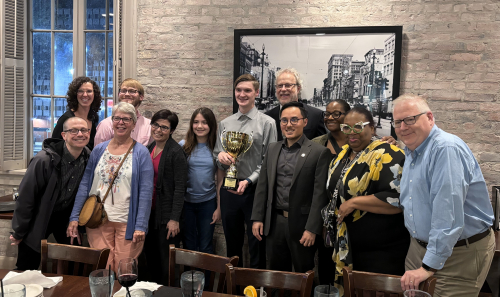

July 24, 2024

Occasionally, I try to look back and see the types of meetings and events that NCAFP leaders and staff attend to represent you, our members. This year, it seems like the meetings and general travel to advocate for Family Medicine in our state have been more extensive than ever. So, I took a moment to reflect on our global NCAFP calendar to describe where we have been representing you. This description is only a sample of what we have been doing on your behalf in the past six months.
Not surprisingly, advocacy with legislators and payers has been at the top of our agenda. As an example, NCAFP President-Elect Dr. Mark McNeill represented our members in a series of five meetings of a legislative-directed group, the Primary Care Payment Reform Task Force. The goal of the Task Force is to increase investment in primary care. While the initial work of the Task Force is done, it is only the first step of an ongoing effort to show the value of primary care. As I write this article, we are preparing for a group of NCAFP leaders to meet with the NC Association of Health Plans about how to implement some of the recommendations of this Task Force, including voluntarily measuring and reporting the percentage of the health care dollar that insurers currently allocate to primary care, and ultimately how to increase that percentage. Your NCAFP has also made a major investment in advertising the importance of Family Medicine and primary care through a series of radio ads on 80 stations across the state, social mirroring, and a new website: www.primarycarenc.org.
Beyond this advocacy, we have had an extensive and continuous presence in the General Assembly this year. In early May, our White Coat Wednesday brought over 40 family physicians, Family Medicine residents and medical students to the General Assembly. The next week, we had another 15 or so residents visit the General Assembly from both the Eastern Carolina University Rural Track and the Univ. of North Carolina Family Medicine Residency. And your staff, leaders, and government affairs consultants are constantly meeting with our elected officials. Beyond the work on primary care investment, we have focused on reducing administrative burden through legislation that would reform the prior authorization process in North Carolina, as well as directly advocating with insurance companies to ask them to reduce the number of procedures and referrals which require prior authorization from family physicians.
Along the way, we attended a number of fundraisers for legislative candidates, represented Family Medicine at an event for physicians and PAs running for the General Assembly in November (there were a total of five candidates from the House of Medicine this year), and multiple legislative receptions, including one hosted by the Association Executives of North Carolina and another by the NC Medical Society. The bottom line? We are in front of your elected officials on a weekly if not daily basis.
Finally, we regularly meet with insurance payers in North Carolina, either on a set schedule or an ad hoc basis. As Aetna begins administration of the State Employees Health Plan at the beginning of next year, we have stepped up efforts to meet with their leaders. Dr. Jessica Triche began service on the Blue Cross and Blue Shield of NC Physician Advisory Group (PAG), taking over for Dr. Alicia Nance, who finished her term representing NCAFP on that PAG. In turn, Dr. Triche has completed her service on the NC Medicaid PAG, and Dr. Ying Vang from Newton Family Physicians is replacing her as our representative there. In addition, I personally represent you on the Duke-Margolis Institute for Health Policy’s Executive Roundtable that includes health plan presidents, health system executives, policy leaders, and other members who come together quarterly to discuss how to transform health care in North Carolina. The consensus of the group places primary care at the center of that transformation.
Current NCAFP President Dr. Garett Franklin has made getting back out to visit member practices one of his priorities for 2024. We had one day of local practice visits in late February and plan to visit some practices in the western Piedmont and foothills later this year.
First, in February, Dr. Franklin and members of the NCAFP staff visited three Wake County practices to better understand their needs. We had great discussions with about 15 member physicians, particularly focusing on the current workforce needs of primary care practices, whether it’s the clinical workforce or the front office staff. Also in February, NCAFP staff visited three practices who participated in a grant we received from UnitedHealthcare. Hodges Family Practice (Asheboro), Clinton Medical Clinic (Sampson County), and Med North FQHC (Wilmington) all received funding to hire additional medical assistants/scribes to improve access to both in-person and telehealth visits by improving administrative workflow. These practice visits were also very helpful to understand the day-to-day issues impacting frontline Family Medicine practices.
I also wanted to give you just a taste of the other meetings where NCAFP physician leaders or staff represent you. Here is a sampling of the committees where we serve or the places where we have shown up to advocate for family physicians this year:
Finally, your staff and leadership have been analyzing the results of our most recent member Needs Assessment, which is conducted every three to four years. Nearly 20% of our Active members and close to 15% of our resident members completed the extensive survey. Your leadership is now reviewing that data and other information to update to the NCAFP Strategic Plan. Look for more information on any changes to our Strategic Plan in the Fall edition of the North Carolina Family Physician, our quarterly magazine.
*A version of this article appeared in the summer issue of The North Carolina Family Physician.